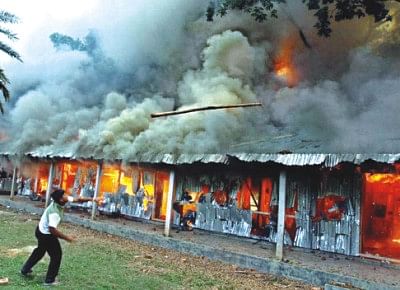Rupganj project: A good idea gone awry

Photo: STAR
Having been in uniform for the better part of 34 years it is difficult to remain detached from anything that relates to the military, particularly to the army. It is even more difficult when an incident happens to be demonstratively manifest and resides in the realm of civil-military relations, which, in the context of Bangladesh, still remains very obscure.
One never wishes, much less, expects that the army would be pitted against the people and even less, have to face the anger of the public on matters that have nothing to do with the execution of official responsibility or is a part of their operational duty or an executive fiat. In fact, the incident had to do with the welfare of officers and men.
It was deeply distressing to see Rupganj happen. One has not forgotten the May 2007 Dhaka University incident that has left indelible marks on the collective psyche of the nation. While on the one hand military vehicles and personnel were targeted, equally reprehensible was the way some students and teachers were treated by the law enforcing agencies at that time; and it all started from a very injudicious decision of the military authorities at the planning level and of the ineptness of the commanders on ground. It was exploited by the trouble mongers too.
In Rupganj things could have been worse. If what happened on October 23 was the result of clumsy work of local commanders dealing with purchase of private lands, that the officers and men were able to extricate unscathed from the spot, and with only a few casualties on the civilian side, is both due to good luck and quick thinking of these very officers on the spot.
One hears of plots, conspiracy and intrigues behind all that happened in Rupganj. That is perhaps the case, but then there was the readymade opportunity for mischief mongers to exploit. And why did the matter come to this? What is even more unacceptable is the blame game that was indulged in by the two political parties.
While it is well to go after the trouble mongers and take up the cosh against the favourite whipping boy for any lapses, the intelligence agencies, it will be advisable to introspect at all levels on the issue dispassionately. We do not want repetition of such incidents. We cannot have a situation which pits a section of the public against the army.
Reportedly, the situation resulted from issues involving purchase of private land by the army for providing land for housing under Army Housing Scheme (AHS).
There are all the good reasons for the army chief to address the urgent welfare needs of his men. And a roof to take shelter under after retirement is perhaps the most pressing need. That was to a very large extent provided for under the DOHS scheme. However, this project also included JCOs and ORs, which was not then case with the DOHS scheme. But land under the DOHS scheme was becoming scarce, and it was only natural for the army to look for alternatives. And, understandably, the project was approved by the government, and funded entirely by the contribution of army personnel. The project, therefore, had the dual character of being both private, being privately funded, and having the sanction of the government it became very much an official venture.
So far so good, but it would not be wrong to suggest that the modalities employed in running the venture were perhaps not quite appropriate. While the government had very rightly, in recognising the needs of the army, approved the project one wonders whether the army should have involved itself in directly going into negotiations for purchase of land, whatever the volume of it may be.
Understandably, a realtor was employed for the purpose that was discarded after sometime, having not come up to the army's expectations. And the consequence of involving in something that the army personnel are not trained to do, nor have done so before, is Rupganj of October 23.
This was a housing scheme for army personnel, and it is for the government to fulfill the genuine welfare needs of the services. One feels that having given the army the approval for the project the government should have arranged for lands without allowing the army to deal directly with the landholders. The MOD and its agencies could have been involved for the purpose of purchase of private land.
Not surprisingly, the situation has been exploited by the mischief mongers. Apparently, misinformation was spread and deliberately fed to the local people to turn them hostile to the army, like the rumour that their lands would be acquired. And this was done with an ulterior motive to protect their vested interest. We understand that all the demands of the locals were acceded to by the AHS authority and things sorted out in the presence of representative from all sides. So why the clash?
A thorough probe must be carried out into this incident to identify the instigators. Certainly, there is more to it than what has appeared in the media.

 For all latest news, follow The Daily Star's Google News channel.
For all latest news, follow The Daily Star's Google News channel. 




Comments